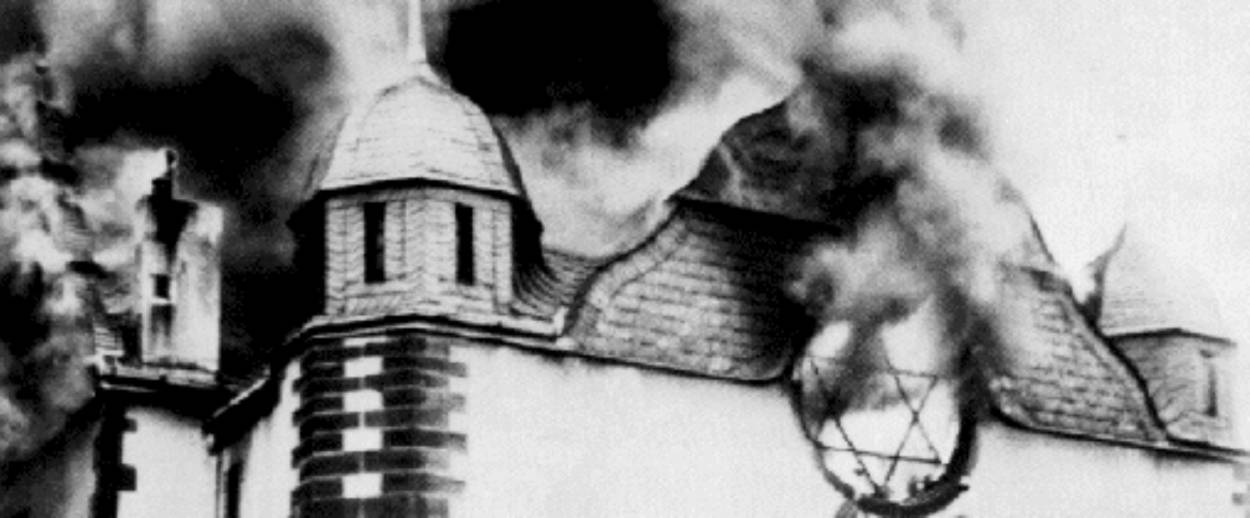Elijah and the Burning Synagogue
For Selichot in 1939, Ruzhan’s Jews prayed beside the ashes of the synagogue where they had almost been burned alive




We are approaching the first night of Selichot, the days leading up to Rosh Hashana and Yom Kippur when supplications are recited in the wee hours of the night or before morning prayers to get us ready for the high holidays. As I prepare, I always think of my father and the Selichot service he was part of in 1939.
My father, Rabbi Simcha Shafran, passed away less than two years ago. In 1939 he was a 14-year-old living in a Polish town called Ruzhan (or Rózan). He had made preparations to travel to Bialystok to study in a yeshivah but his plans were rudely interrupted by the German invasion of Poland on September 1, the start of the Second World War. He was only a boy at the time.
The boy’s family, along with all of Ruzhan’s Jewish townsfolk, fled just ahead of the advancing Germans. That Friday, they found themselves in a town called Govrova. That Saturday night would be the first night of Selichot.
My father would eventually end up spending the war years in a Siberian work camp courtesy of the Soviet government, and, after the war, would make his way to Baltimore, Maryland, where he served as a congregational rabbi for more than a half-century – and where, during the first years of his career, my sister, brother and I were born.
For many years, he chose not to talk about the war. Even as a teenager, I never thought to try to make him tell us all that happened to him. But when I was well into adulthood and living in a different city, my father was once prevailed upon by some Baltimoreans to speak to a Yom Hashoah gathering about his wartime years. Someone sent me a recording of his riveting speech and, not long afterward, I convinced him to sit for an hours-long interview for the Shoah Foundation.
There was much in his recounting that made me shudder, and much that made me cry. His Siberian sojourn was a mesmerizing documentary unto itself. But what I recall this time each year was what happened to the Ruzhaner refugees and the Jewish townsfolk in Govrova that Sabbath day before Selichot. It’s an incredible story, almost impossible to believe, and yet there were other witnesses who survived and testified to the same events my father had described.
The refugees had all been taken in by Govrova’s Jewish families. My father and his parents and siblings were lying on the floor of their hosts’ home when they heard angry banging on the door and shouts of “Raus Jude! Raus Jude!” – “Jew, out!”
At the points of bayonets, they and all the Jews were herded to the town’s market square. The men’s beards were shorn off to humiliate them. One elderly man, my father recalled, tied a towel around his head to try to hide his long, particularly beautiful beard. When the Germans yanked the towel off and sheared what to the man was a symbol of experience and wisdom, he wept uncontrollably.
The herded smelled smoke. The town’s homes had been set ablaze, supposedly because a German soldier had been discovered killed nearby.
The Jews were ordered into the still intact shul, and the building’s doors were blocked from the outside.
The scene inside was a blizzard of shouting, wailing and praying, a cacophony of wrenched hearts. My father, like all the trapped Jews, with the sound of the fire growing louder, realized that there was nothing any of them could do, and prepared for the end.
And then came the miracle.
How else to describe it? The imprisoned Jews standing near some windows saw a German motorcycle come to a halt in front of the building. A German officer – apparently of high rank – dismounted and began to speak with the SS men guarding the makeshift crematorium. The officer grew agitated and barked orders at the other Nazis. After a few minutes, the doors to the synagogue were suddenly opened and, disbelieving their good fortune, the previously doomed staggered out.
No one knew what the officer had said, but his sudden timely appearance convinced them that he must have been Elijah the prophet, who, according to Jewish tradition, never died and often appears in disguise to help Jews.
The human “brands plucked from the flames” were ordered to march across a nearby brook.
And there they sat, all through the Sabbath, watching as the shul in which they had been imprisoned mere hours earlier was claimed by fire and, along with all the Torah-scrolls and holy books of both Ruzhan and Govrovo, burned to the ground.
That Saturday night, the group recited Selichot. The prayer-pleas for forgiveness were said, as one might imagine, with special feeling.
This year, as usual, I will spend the first night of Selichot in a stately, comfortable, air conditioned shul in Staten Island, where my wife and I live.
And, though I wasn’t in Govrovo in 1939, or even on this earth, I will always vividly see in my mind’s eye, what transpired there and then.
Rabbi Shafran, whose latest book is “It’s All In The Angle” (Judaica Press), blogs at rabbiavishafran.com.